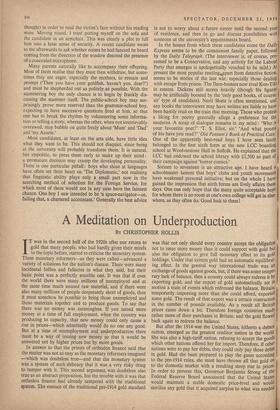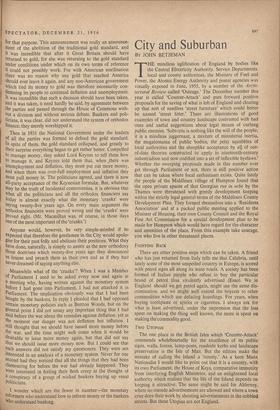A Meditation on Underproduction
BY CHRISTOPHER HOLLIS IT was in the second half of the 1920s after our return to gold that many people. who had hardly given their minds to the topic before, started to criticise the monetary system. These monetary reformers—as they were called—advanced a variety of solutions for the nation's disease. There were many incidental follies and fallacies in what they said, but their basic point was a perfectly sensible one. It was that if over the world there were many millions of unemployed and at the same time much unused raw material, and if there were also many millions of people desperately short of goods, then it must somehow be possible to bring those unemployed and those materials together and to produce goods. To say that there was no money was meaningless. If you issued more money at a time of full employment, when the country was producing to capacity, that new money could only cause a rise in prices—which admittedly would do no one any good. But at a time of unemployment and underproduction there must be a way of issuing new money so that it would be answered not by higher prices but by more goods.
In answer to that the priests of orthodox finance said that the matter was not as easy as the monetary reformers imagined —which was doubtless true—and that the monetary system was a system of such delicacy that it was a very risky thing to tamper with it. This second argument was doubtless also true as an abstract proposition, but the trouble with it was that orthodox finance had already tampered with the traditional system. The essence of the traditional pre-1914 gold standard
was that not only should every country accept the obligation not to issue more money than it could support with gold but also the obligation to give full monetary effect to its gold holdings. Under that system gold had an automatic equilibrat• ing effect. In the general way international trade was an exchange of goods against goods, but, if there was some tempo' rary lack of balance, then a country could always redress it by exporting gold, and the export of gold automatically set in motion a train of events which redressed the balance. Britain, temporarily importing more than she could afford, exported some gold. The result of that export was a certain contraction in the number of pounds available. As a result all British prices came down a bit. Therefore foreign countries made rather more of their purchases in Britain, and the gold flowed back again to redress the balance.
But after the 1914 war the United States, hitherto a debtor nation, emerged as the greatest creditor nation in the world. She was also a high-tariff nation, refusing to accept the goods which other nations offered her for import. Therefore, if other nations were to pay her debts, they could only pay those debts in gold. Had she been prepared to play the game according to the pre-1914 rules, she must have thrown all that gold on to the domestic market with a resulting steep rise in prices. In order to prevent this, Governor Benjamin Strong of the Federal Reserve Board announced that the United States would maintain a stable domestic price-level and would sterilise any gold that it acquired surplus to what was needed for that purpose. This announcement was really an announce- ment of the abolition of the traditional gold standard, and It was incredible that after it Great Britain should have returned to gold, for she was returning to the gold standard under conditions under which on its own terms of reference It could not possibly work. For with American sterilisation there was no reason why any gold that reached America should ever leave it again, and any non-American government Which tied its money to gold was therefore necessarily con- demning its people to continual deflation and unemployment. It was incredible that such a decision should have been taken, and it was taken, it need hardly be said, by agreement between the parties and passed through the House of Commons with- out a division and without serious debate. Bankers and poli- ticians, it was clear, did not understand the system of orthodox finance; they merely worshipped it.
Then in 1931 the National Government under the leaders of all the parties was formed to defend the gold standard. In spite of them. the gold standard collapsed, and greatly to their surprise everything began to get rather better. Compelled to manage money, they asked Lord Keynes to tell them how to manage it, and Keynes told them that, when , there was unemployment and deflation, they must put out more money, and when there was over-full employment and inflation they Must pull money in. The politicians agreed, and there is now all-party acceptance of the Keynesian formulae. But, whatever May be the truth of incidental controversies, it is obvious that What all the politicians and all the orthodox financiers say today is almost exactly what the monetary 'cranks' were saying twenty-five years ago. On every main argument the orthodox financiers were proved wrong and the 'cranks' were proved right. (Mr. Macmillan was, of course, in those days one of the most important of the 'cranks.') Anyone would, however, be very simple-minded if he expected that therefore the gentlemen in the City would apolo- gise for their past folly and abdicate their positions. What they have done, naturally, is simply to annex as the new orthodoxy those doctrines which twenty-five years ago they denounced as insane and preach them as their own and as if they had never dreamed of saying anything else.
Meanwhile what of the 'cranks'? When I was a Member of Parliament I used to be asked every now and again at a meeting why, having written against the monetary system before I had gone into Parliament, I had not attacked it in Parliament. The implication obviously was that I had been bought by the bankers. In reply 1 pleaded that I had opposed certain monetary policies such as Bretton Woods, but on the general point I did not unsay any important thing that I had said before the war about the remedies against deflation. yet at the moment our danger was not deflation but inflation. I still thought that we should have issued more money before the war, and the time might well come when it would be desirable to issue more money again, but that did not say that we should issue more money now. But I could see that Such answers did not satisfy my questioners. They were not Interested in an analysis of a monetary system. Never for one second had they noticed that all the things that they had been clamouring for before the war had already happened. They were interested in feeling their flesh creep at the thought of a conspiracy of a group of wicked bankers buying up venal Politicians.
I wonder which are the fewer in number—the monetary reformers who understand how to reform money or the bankers Who understand banking.



































 Previous page
Previous page